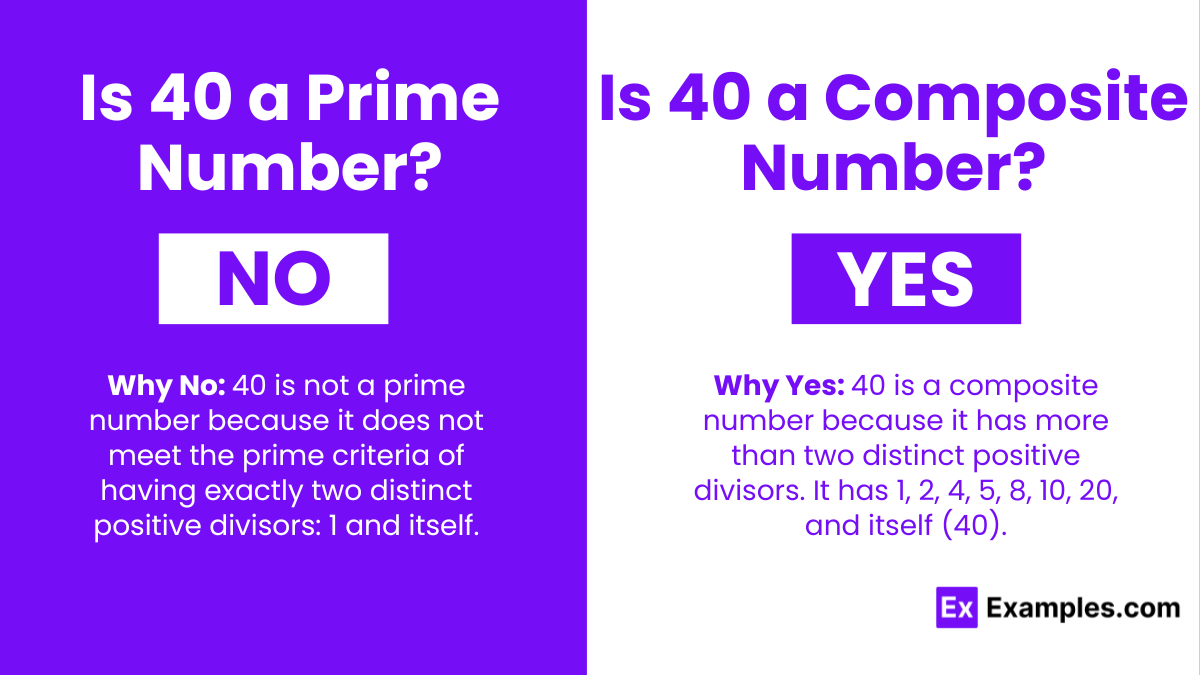Is 40 a prime number or composite number?
Prime
Composite
Neither
Both


No – 40 is not a Prime Number.
Why No: 40 is not a prime number because it does not meet the prime criteria of having exactly two distinct positive divisors: 1 and itself. See any number if it’s prime number or not
Yes – 40 is a Composite Number.
Why Yes: 40 is a composite number because it has more than two distinct positive divisors. It has 1, 2, 4, 5, 8, 10, 20, and itself (40).
| Property | Answer |
|---|---|
| Is 40 a prime number? | No |
| Is 40 a composite number? | Yes |
| Is 40 a perfect square? | No |
| Factors of 40 | 1, 2, 4, 5, 8, 10, 20, 40 |
| Multiples of 40 | 40, 80, 120, 160, 200, 240, 280, 320, 360, 400 |
| Cube Root of 40 | 3.420 |
| Square of 40 | 1600 |
| Square Root of 40 | 6.325 |
| Is 40 a Perfect Square? | No |
| Is 40 a Perfect Cube? | No |
| Is 40 an Irrational number | No |
| Is 40 a Rational number | Yes |
| Is 40 a Real number | Yes |
| Is 40 an Integer | Yes |
| Is 40 a Natural number | Yes |
| Is 40 a Whole number | Yes |
| Is 40 an Even or odd number | Yes (40 is an even number) |
| Is 40 an Ordinal number | Yes |
| Is 40 a Complex number | Yes (as all real numbers are also complex numbers) |
The factors of 40 are 1, 2, 4, 5, 8, 10, 20, and 40. 40 is not a prime number because it is divisible by numbers other than 1 and itself, highlighting its composite nature. It has multiple factors, making it clear that it is a composite number and not a prime number.
40 is recognized for its status as a composite number, marked by its divisibility by numbers other than just 1 and itself. The number 40, as a composite number, holds a distinct place in mathematics and conceptual frameworks. Its properties as an even number, a composite, and a natural number make it a notable figure in various mathematical discussions.
The composite numbers under 40 are all non-prime numbers greater than 1 and less than 40, excluding 2, 3, 5, 7, 11, 13, 17, 19, 23, 29, 31, and 37.
To do prime factorization of 40, divide it by the smallest prime number (2) repeatedly until you cannot divide evenly anymore, then proceed with the next smallest prime (5): 23×523×5.
Text prompt
Add Tone
10 Examples of Public speaking
20 Examples of Gas lighting
Is 40 a prime number or composite number?
Prime
Composite
Neither
Both
Which of the following statements is true about the number 40?
It is a prime number because it is greater than 1.
It is a composite number because it has multiple factors.
It is a prime number because it is divisible by 2.
It is neither prime nor composite.
The number 40 is best classified as:
A perfect number
A prime number
A composite number
A square number
How can you determine if 40 is a prime or composite number?
Check if 40 has exactly two distinct positive divisors.
Verify if 40 can be divided by numbers other than 1 and itself.
Confirm if 40 is a factor of itself only.
Check if 40 is a prime number.
Which of these numbers is not a factor of 40?
2
5
7
10
Is 40 considered a prime number in the set of natural numbers?
Yes, because it is divisible by 2.
Yes, because it is greater than 1.
No, because it is less than 50.
No, because it has multiple factors.
Which characteristic indicates that 40 is a composite number?
It is a single-digit number.
It has only two factors.
It is divisible by numbers other than 1 and itself.
It is an even number.
40 can be evenly divided by:
Only 1 and 40
1, 2, 4, 5, 8, 10, 20, and 40
1 and 2
Only 2 and 5
Which of these pairs shows a correct factor pair for 40?
3 and 15
7 and 6
9 and 4
8 and 5
Which property does not apply to the number 40?
It has more than two factors.
It is divisible by only 1 and itself.
It is an even number.
It can be factored into smaller numbers.
Before you leave, take our quick quiz to enhance your learning!

